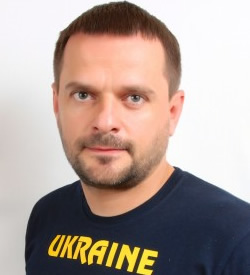

Follow these links to find out more about the Health Policy Project's related work.
- Read about HPP's work involving Health Finance
- Explore HPP publications that relate to Health Financing
- Read about HPP's activities in Ukraine
Organization: Patients of Ukraine
Country: Ukraine
Area of Response to HIV: Financing, Hepatitis C, andHIV
Interview was originally published in the February 2015 newsletter.
Interview with Dmytro Sherembey
Dmytro Sherembey is the chairman of the Board of Directors for Patients of Ukraine, a charitable foundation that advocates for the health needs of Ukraine's vulnerable populations. He is also a dedicated activist on behalf of numerous health and human rights causes. Sherembey spoke with the HIV Policy and Advocacy Monitor about his organization's work in Ukraine and challenges faced by people living with HIV (PLHIV) during the current geopolitical crisis.
HIV Policy and Advocacy Monitor: What drove you to become involved in advocacy?
I have advocated on behalf of a variety of health- and governance-related causes for more than 20 years and view myself as a product of others' advocacy work, especially that of the ACT UP movement in the United States during the early years of the global HIV epidemic. When I contracted HIV 15 years ago, there was no treatment available in Ukraine. To be treated, you had to either travel abroad or do what I did, along with several other activists: stay and fight for the right to treatment. ACT UP fought for access to combination therapy treatment and demanded that it be made available to everyone around the world. Between their advocacy and our own, Ukrainians like me are on therapy, alive, and thriving.
HIV Policy and Advocacy Monitor: Can you provide examples of successful Patients of Ukraine advocacy campaigns?
In 2011, it was unclear whether the government would continue to provide antiretroviral therapy (ART) to those already receiving the treatment. In collaboration with the Ukrainian Network of People Living with HIV, Patients of Ukraine collected 500 postcards signed by children living with or affected by HIV and delivered them to the president at a press conference. Each card included the campaign's request to the president's administration: "Let us live." After the conference, the prime minister signed an order to finance treatment for PLHIV and, in January 2012, the minister of health announced that the state would pay for treatment for an additional 42,000 Ukrainians living with HIV.
Now, with the currency devaluation and the war, there are once again concerns about whether the government will be able to continue financing treatment. Patients of Ukraine has proposed a tax on alcohol and tobacco to help fund the health sector. Advocacy helps us find solutions to health problems and promote change in the broader health system. It is the key to our success because, from an investment perspective, it provides a significant return by impacting many people's lives.
HIV Policy and Advocacy Monitor: How have the ongoing conflict with Russia and Ukraine's internal strife compromised health services in Crimea and in the east and southeast of Ukraine?
Services have been most compromised in areas not controlled by Ukraine. Volunteer organizations have tried to deliver ART to conflict zones but it is not possible to systematically control the delivery process. This leaves people exposed to possible treatment discontinuation, worsening health, and increased risk of transmission. After the war, rebuilding the most conflict-affected regions and ensuring access to HIV care and treatment for residents of these places will be very difficult.
HIV Policy and Advocacy Monitor: How has your organization's work changed or refocused since the 2014 change in government?
Patients of Ukraine is currently engaged in a healthcare sector reform initiative. We have presented ideas and proposals to the government and will continue advocating for healthcare reform in 2015. We will begin by targeting the pharmaceutical sector to make medicines on the market less expensive by allowing, for example, direct procurement of medical supplies. We are also working to liberalize domestic markets by breaking down barriers to creating and developing high-quality medicines in Ukraine. Reducing the money spent on medicines will free resources for Ukrainian hospitals to more effectively meet the needs of their patients. As a result of direct procurement and a more liberal marketplace, the country would recoup over a billion dollars from black market sales.
These efforts will be followed by a service availability assessment to monitor the health sector and produce valuable data for use in a range of advocacy efforts. Saving lives has to be the state's top priority; it is a crime for a government to withhold life-saving treatment from its citizens. Patients of Ukraine works to remind the state of this priority, particularly in the context of its 2015 budget.
HIV Policy and Advocacy Monitor: How does Patients of Ukraine keep up-to-date and knowledgeable about relevant issues to present decisionmakers with appropriate solutions?
We never expect someone to solve anything for us; change is something you have to achieve on your own. Our organization tries to build its expertise around advocacy topics by seeking knowledge from various stakeholders and experts, and collaborating with people who share our views and beliefs. By collecting this knowledge and experience, we use it to affect positive change.